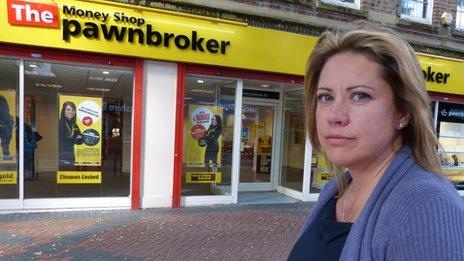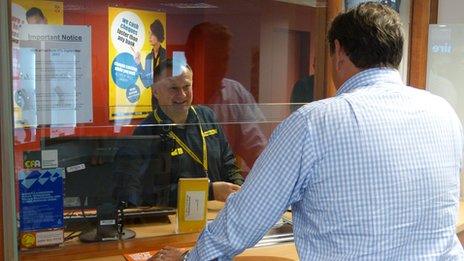Payday lenders bite back: 'Don't call us loan sharks'
- Published

The Money Shop's Caroline Walton is fed up with the company's poor reputation
Everyone it seems has a shocking story about payday loans. Even my taxi driver.
"My wife's uncle borrowed £500 to repair his car, and now he owes them £16,000. It has totally ruined him," he says.
Fed up with such stories, and pilloried by MPs, local authorities, newspapers and even the Archbishop of Canterbury, the payday loans industry is now fighting to improve its reputation.
"Our detractors are miscommunicating by calling this industry legal loan sharking. Because it is blurring the edges for people as to what a loan shark actually is," says Caroline Walton, corporate affairs director of Dollar Financial UK, which owns The Money Shop.
So for the first time in its 13-year history, the biggest payday lender on the High Street agreed to give the BBC access to one of its branches.
Until now The Money Shop has refused to allow any journalist to meet its customers, or watch the lending process.
Which is why my taxi driver is taking me to Bulwell, a suburb of Nottingham where The Money Shop has two of its 575 branches.
The shop - plate glass and bright yellow - faces onto the High Street for all the world like it is a shiny new branch of a bank.
But are the loans on offer here, with typical APRs of 3,000%, really the evil they have been made out to be?
'Banks don't help'
"Can I take out one of them payday loans?" refuse collector Chris Riley asks at the counter.
Twenty minutes later, he walks out of the store with £150 cash in a brown envelope.
"Just to help me out till I get paid at the end of the month," he explains.
On his salary of £13,500 a year, he says he will pay it back "no problem".
Behind him is Damien McGlinchey, a 27-year-old care worker, who has popped in to pay off his loan of £280, which was for a rather more frivolous purpose.
"I was struggling to pay for my birthday party," he says. "It was quite a big do."
But what unites all the customers is dissatisfaction with banks.
"The banks don't help," maintains Chris Riley.
"They wouldn't give us an overdraft, even though I'm on a salary."
The real sharks?
Customers to the Money Shop pay £29.99 to borrow £100 for a month.
But Caroline Walton insists her company's charges are justified.
"Someone comes in to the store, you've never seen them before, you've got to invest in all the security, you've got to train your staff, and yet £29 is seen as profiteering," she told the BBC.
She also warns that if customers cannot get a loan through a payday lender, they are likely to turn to unregulated lenders.
"The consequences are not just financial. They are physical consequences - intimidation, and threatening you through your family," she says.
She says such people, who "operate under the radar", are the real sharks.

Customers at The Money Shop can get a payday loan in 20 minutes
Credit unions alternative
The Money Shop's fees are lower than their rival Wonga, which charges £37.15 to borrow £100 for a month, but much more than a typical credit union.
Credit unions - not-for-profit organisations, which belong to their members - have been backed by the Archbishop of Canterbury, Justin Welby, who wants them to "compete" payday lenders out of business.
A few of them, such as the London Mutual Credit Union (LMCU), provide payday loans.
For such a loan, LMCU charges £11, plus a £2 membership fee. Borrowers have to live in the London boroughs of Southwark, Lambeth, Westminster or Camden.
Jane Symonds, from the Money Advice Service, says that if people have to borrow money, a credit union is a good place to start.
"There's a cap on the amount of interest they can charge on their loans of 2% a month or 26.8% a year APR," she says.
"However, some credit unions insist you save with them first before they'll let you take out a loan."
Responsible lending
Many customers have little real choice of course but to turn to a payday lender. The banks shy away from payday loans, and few people have access to such borrowing through credit unions.
Yet by going to a regulated payday lender which is a member of the Consumer Finance Association (CFA), they are at least guaranteed some safeguards, which go beyond the government's customer charter.
Under the CFA's lending code, which came in last year, borrowers are promised:
proper affordability assessments, to make sure they can repay the loan
a maximum of three loan extensions, or roll-overs, which can push them into financial difficulty
interest charges will be frozen after 60 days of non-payment
special treatment if they have mental health issues, or are members of the armed forces
In other words the taxi driver's anecdote, of a debt rising from £500 to £16,000, is more likely to be urban myth than true story, especially if the lender concerned was a member of the CFA.
Nineteen payday lenders who did not adhere to this code, have already dropped out of the business, after the Office of Fair Trading (OFT) wrote to the 50 biggest operators in the UK.
A further six lenders have either withdrawn voluntarily, or had their licences revoked by the OFT.
Profits
But are payday lenders giving the consumer a reasonable deal, or are they making good profits from the low-paid?
A glance at the profits of Dollar Financial's US parent company, DFC global, reveals that although the company operates in 10 countries around the world, half its profits come from the UK.
Trading as Instant Loans ltd, Dollar Financial UK reported profits of £34.6m to Companies House last year.
Only a portion of that would have come from the payday loans business, as the company also owns a string of pawn brokers, some of which operate within the Money Shop brand as well.
Earlier this year, the company also said profits in the UK would be squeezed, as a result of the OFT investigations.
That has still left it with healthy profits, but less than half those of rival Wonga, which recently reported annual profits of £84.5m.
But in any case, Caroline Walton has no moral qualms about how her company makes money.
"We provide our customers with a service," she says.
"And yes, I sleep well at night."